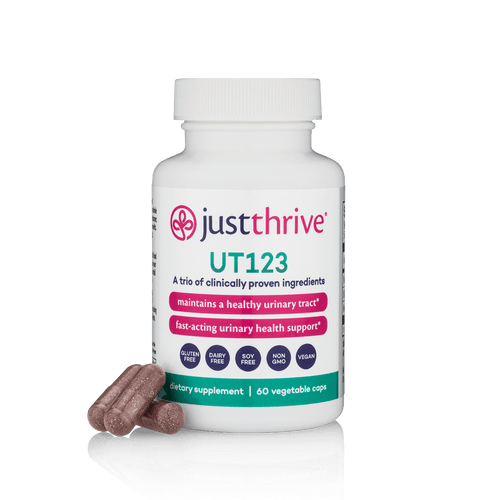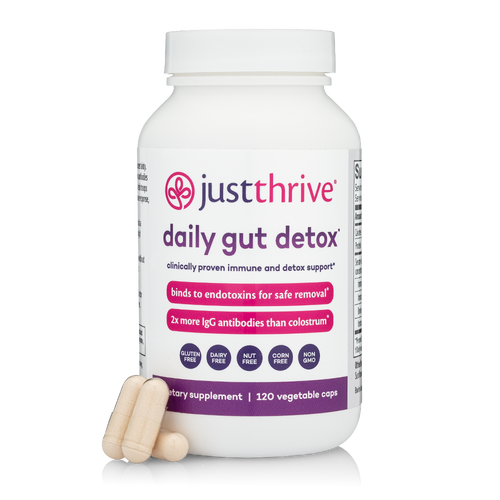You spend days feeling bloated, cranky, and crampy. Sometimes the pain gets so bad that you can’t make it through work or school.
And while getting your period is inescapable, suffering through it doesn’t have to be.
Your worst period symptoms come from estrogen overload. And there’s a simple way to deal with that…
Ensure your gut microbiome is balanced so it can do its job… and keep your hormones from running wild.
Estrogen Intensifies Period Pain
Frustrating and painful period symptoms come from a mismatch in hormone levels—too much estrogen and not enough progesterone.[1]
We call this estrogen dominance, and it can make your period extra miserable.
Estrogen dominance can cause all sorts of symptoms, including:
- Abdominal pain
- Breast tenderness
- Heavy periods
- Irregular periods
- Intense cramping
- Bloating
- Mood swings
- Weight gain
So you can blame too much estrogen for your discomfort… and you can blame your gut for the excess estrogen.

Your Gut Microbiome Manages Estrogen
Your body is equipped with a natural hormone balancing system, and it centers on your gut microbiome—the trillions of bacteria in your gut.
In a healthy, well-balanced gut microbiome, beneficial probiotic bacteria outnumber harmful pathogenic bacteria.
Those probiotic bacteria positively influence every system in your body. That includes managing the hormones that come into play during your period.
A collection of certain types of bacteria—known as the estrobolome—regulate the levels of estrogen in your body.[2]
Here’s how that works[3]...
To get rid of extra estrogen, your body bundles it up and sends it through your digestive system for excretion. Once it reaches your estrobolome, the bacteria there unpack it using an enzyme called beta-glucuronidase.[4]
This effectively breaks down the estrogen bundles; some of the estrogen gets reactivated and sent back through your bloodstream to be utilized... while the estrogen your body doesn’t need gets lined up for excretion.
When your gut microbiome is in healthy balance, you produce the exact right amount of beta-glucuronidase to keep your estrogen levels where they need to be.
But when your gut microbiome is out of balance, a condition called dysbiosis, this estrogen-balancing system crashes.
An Unbalanced Gut Makes Period Problems Worse
Dysbiosis—a condition where pathogens outnumber probiotics in your gut microbiome—can knock your estrogen levels out of whack.[5] It disrupts the normal balancing process by changing the amount of beta-glucuronidase produced in your estrobolome.
Too much beta-glucuronidase leads to too much circulating estrogen… and results in estrogen dominance.
That greatly disrupts your feminine flow and can lead to all sorts of uncomfortable symptoms.
And to make matters worse, those harmful bacteria also produce toxins called lipopolysaccharides (or LPS toxins).[6] LPS toxins damage the protective lining of your gut so they can escape into your bloodstream.
Once LPS toxins are circulating, they can cause inflammation all over your body. They can also mess with your hormone levels…making your period symptoms unusually intense.[7]

Balancing Your Gut Creates a Healthy Estrogen Balance… and More
Getting—and keeping—your gut microbiome in healthy balance helps ensure your estrogen levels stay in check. In turn, that can help your period to be more regular and less painful.
And the benefits don’t stop there...
A healthy gut microbiome helps you stay healthy, energetic, and happy. That’s because your gut has connections with every system in your body. So a well-balanced gut can deliver all kinds of systemic support, including:
- Keeping your skin clearer[8]
- Managing sugar cravings[9]
- Maintaining a healthy weight[10]
- Getting a good night’s sleep[11]
- Balancing your blood sugar[12]
- Promoting a healthy inflammatory response[13]
- Keeping your immune system strong and prepared[14]
Unfortunately, it doesn’t take much to tip your gut microbiome out of balance.[15] A single dose of antibiotics can do it. So can stress and unpredictability, an unhealthy diet, and infections.
Luckily, supplementing with spore probiotics can keep your gut healthy and balanced.
Feel Your Best at All Times of the Month with Just Thrive Probiotic
Unlike other probiotics you might see on the shelves, spore probiotics arrive in your gut 100% alive and ready to work. Once there, they clear out pathogens so other beneficial bacteria can flourish—exactly the support your gut needs to stay in balance.
Just Thrive Probiotic contains a clinically-tested blend of powerful, proprietary spore strains:
- Bacillus subtilis HU58™
- Bacillus clausii
- Bacillus indicus HU36™
- Bacillus coagulans
Together, this combination of spore probiotics has been shown to maintain a healthy microbiome and minimize lipopolysaccharides.[16]
Plus, Just Thrive Probiotic can help:
- Encourage a wide variety of beneficial bacteria to flourish
- Promote optimal energy, sleep, and clear skin
- Produce antioxidants at the site of peak absorption
- Support healthy, balanced hormone levels
Just Thrive delivers an ideal mix of high quality probiotics… just what your gut needs to stay healthy so you can feel your best.
>> Add Just Thrive to your daily routine today to feel your best every day!
Not sure if Just Thrive Probiotic is right for you? We’ve got your back!
If for any reason you don’t love it (but we’re betting you will!), you can ask for a full product refund at any time. Even if it’s 3 months or 3 years later. Even if the bottle is empty! You’ll get your money back any time, no hassles, no hard feelings.
Sources
- Fang L, Gu C, Liu X, et al. Metabolomics study on primary dysmenorrhea patients during the luteal regression stage based on ultra performance liquid chromatography coupled with quadrupole‑time‑of‑flight mass spectrometry. Mol Med Rep. 2017;15(3):1043-1050. doi:10.3892/mmr.2017.6116
- Kwa M, Plottel CS, Blaser MJ, Adams S. The Intestinal Microbiome and Estrogen Receptor-Positive Female Breast Cancer. J Natl Cancer Inst. 2016;108(8):djw029. Published 2016 Apr 22. doi:10.1093/jnci/djw029
- Jones C. Estrogen dominance: When an Unhealthy Gut Estrobolome Is to Blame. Naturopathic Doctor News & Review. Published February 7, 2019. Available from: https://ndnr.com/endocrinology/estrogen-dominance-when-an-unhealthy-gut-estrobolome-is-to-blame/. Accessed February 28, 2024.
- Ervin SM, Li H, Lim L, et al. Gut microbial β-glucuronidases reactivate estrogens as components of the estrobolome that reactivate estrogens. J Biol Chem. 2019;294(49):18586-18599. doi:10.1074/jbc.RA119.010950
- Baker JM, Al-Nakkash L, Herbst-Kralovetz MM. Estrogen-gut microbiome axis: Physiological and clinical implications. Maturitas. 2017;103:45-53. doi:10.1016/j.maturitas.2017.06.025
- Wang J, Gu X, Yang J, Wei Y, Zhao Y. Gut Microbiota Dysbiosis and Increased Plasma LPS and TMAO Levels in Patients With Preeclampsia. Front Cell Infect Microbiol. 2019 Dec 3;9:409. doi: 10.3389/fcimb.2019.00409.
- Bidne KL, Dickson MJ, Ross JW, Baumgard LH, Keating AF. Disruption of female reproductive function by endotoxins. Reproduction. 2018;155(4):R169-R181. doi:10.1530/REP-17-0406
- Lee YB, Byun EJ, Kim HS. Potential Role of the Microbiome in Acne: A Comprehensive Review. J Clin Med. 2019;8(7):987. Published 2019 Jul 7. doi:10.3390/jcm8070987
- Anderson SC. The Shocking Source of Your Cravings. Psychology Today. Published May 7, 2019. Available from: https://www.psychologytoday.com/us/blog/mood-microbe/201905/the-shocking-source-your-cravings. Accessed February 28, 2024.
- Davis CD. The Gut Microbiome and Its Role in Obesity. Nutr Today. 2016;51(4):167-174. doi:10.1097/NT.0000000000000167
- Smith RP, Easson C, Lyle SM, et al. Gut microbiome diversity is associated with sleep physiology in humans. PLoS One. 2019;14(10):e0222394. Published 2019 Oct 7. doi:10.1371/journal.pone.0222394
- Gérard C, Vidal H. Impact of Gut Microbiota on Host Glycemic Control. Front Endocrinol (Lausanne). 2019;10:29. Published 2019 Jan 30. doi:10.3389/fendo.2019.00029
- Lobionda S, Sittipo P, Kwon HY, Lee YK. The Role of Gut Microbiota in Intestinal Inflammation with Respect to Diet and Extrinsic Stressors. Microorganisms. 2019;7(8):271. Published 2019 Aug 19. doi:10.3390/microorganisms7080271
- van der Lelie D, Taghavi S. COVID-19 and the Gut Microbiome: More than a Gut Feeling. mSystems. 2020;5(4):e00453-20. Published 2020 Jul 21. doi:10.1128/mSystems.00453-20
- Hawrelak JA, Myers SP. The causes of intestinal dysbiosis: a review. Altern Med Rev. 2004;9(2):180-197.
- McFarlin BK, Henning AL, Bowman EM, Gary MA, Carbajal KM. Oral spore-based probiotic supplementation was associated with reduced incidence of post-prandial dietary endotoxin, triglycerides, and disease risk biomarkers. World J Gastrointest Pathophysiol. 2017;8(3):117-126. doi:10.4291/wjgp.v8.i3.117














